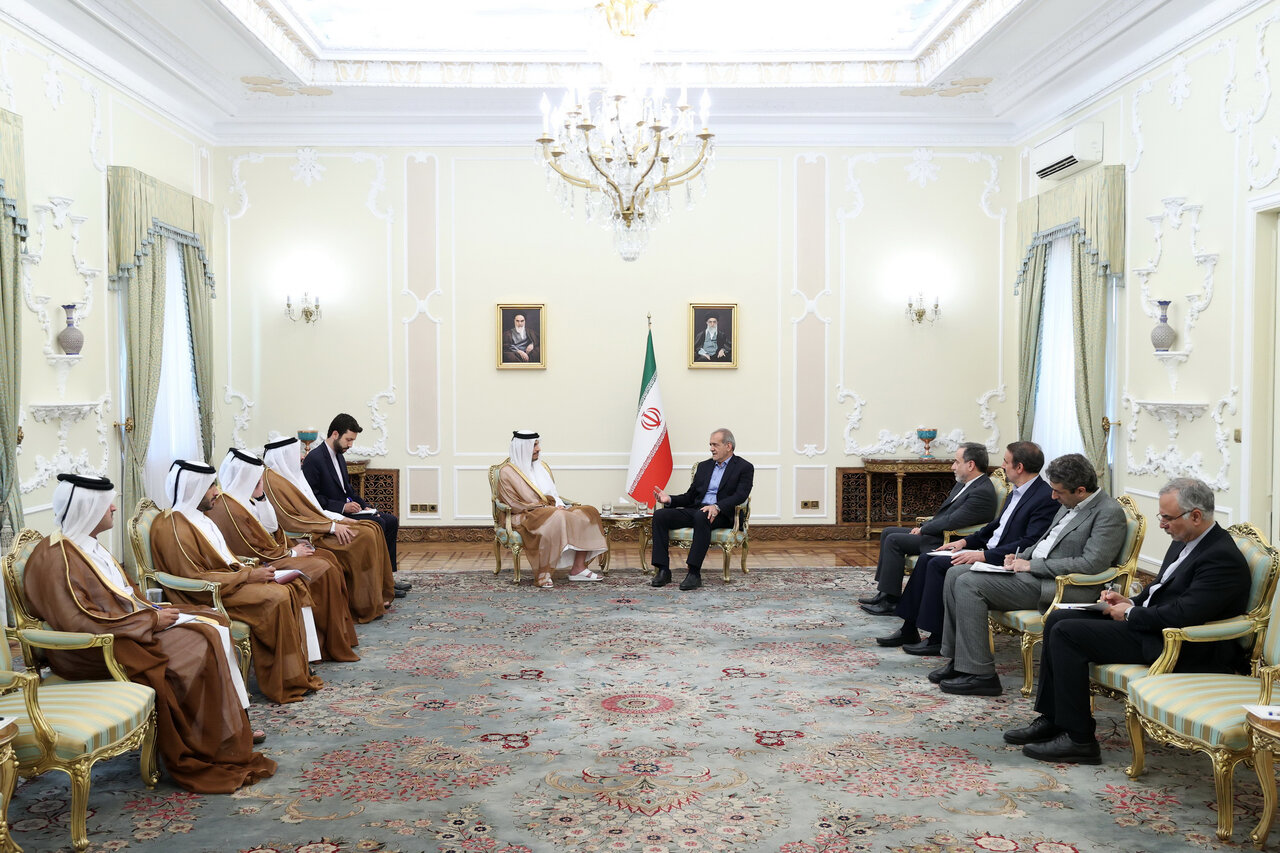A response in the making
Qatari FM's Monday visit to Tehran seen as last push to dissuade Iran from retaliation against Israel

TEHRAN – The Qatari Prime Minister and Minister of Foreign Affairs arrived in Tehran on Monday against the backdrop of a worsening regional situation: Gaza ceasefire talks have ended in Doha without any progress, Israel continues to pummel Gaza and murder its civilians, and Iran is poised to retaliate against Israel for its assassination of Hamas Political Chief Ismail Haniyeh in Tehran.
Official sources have depicted the meeting between Qatar’s Mohammed bin Abdulrahman Al-Thani and new Iranian top Diplomat Abbas Araqchi as a routine diplomatic encounter between two nations with friendly relations. According to statements from both the Iranian and Qatari Foreign Ministries, the two officials covered various topics, including bilateral relations, the current situation in Gaza and the occupied territories, and progress on ceasefire mediation. Al-Thani's subsequent meeting with Iranian President Masoud Pezeshkian was reportedly focused on the same issues. Despite analysts' belief that Iran's potential retaliation was a key factor driving the unscheduled visit, official statements make no mention of the issue being raised during the meetings.
Following Haniyeh’s assassination in a Tehran guesthouse on July 31, Leader of the Islamic Revolution Ayatollah Seyyed Ali Khamenei vowed to avenge the blood of Iran’s “dear guest”. “The criminal and terrorist Zionist regime martyred our dear guest in our house and made us bereaved,” the Leader said in a statement published through his website, adding that “it also prepared the ground for a harsh punishment for itself.”
After Ayatollah Khamenei, multiple Iranian officials reiterated his vow for revenge. With that, a flux of diplomatic calls was directed at Araqchi’s predecessor Ali Baqeri Kani, who told his regional and international counterparts that Iran reserves the right to respond to the regime’s aggression. His persistence brought Jordan’s Foreign Minister to Tehran for the first time in two decades.
After about ten days and the beginning of a new round of Gaza ceasefire talks, which followed a 3-months stall, the prospects of an Iranian retaliation faded into the background. As more days passed by, some even began questioning whether Iran had abandoned its plans for retribution.
But Hezbollah’s Operation Arbaeen on Sunday, and its successful targeting of several Israeli military and intelligence bases, has reignited anxieties among Israel's Western backers and regional allies regarding Iran's promised retaliation.
Afifeh Abedi, a researcher and expert on foreign affairs, suggests that the Qatari Foreign Minister's visit to Tehran on Monday was part of a broader effort to link a Gaza ceasefire deal with Iran's stance and actions in regard to Israel. “Western states and some of their regional allies are attempting to conflate these two distinct issues. That’s because Iran's proactive efforts to resolve the Gaza conflict, even in the wake of the Zionist regime's attack on its consulate in Damascus, have led to a perception that Iran's potential retaliatory actions against Tel Aviv are negotiable.” She explained, adding, “A full ceasefire in Gaza is undoubtedly the right of the Palestinian people while responding to the regime’s aggression on Iranian soil is Tehran’s legitimate right.”
What will Iran’s retaliation be like?
Till now, no one has managed to predict how Iran will be responding to Israel for its assassination of Hamas’ Haniyeh. Hezbollah’s Operation Arbaeen which was launched in response to the regime’s killing of high-ranking Lebanese Commander Fouad Shokor might serve as a potential blueprint. The operation involved a coordinated attack on Israeli military facilities, including Iron Dome platforms, using a barrage of over 320 Katyusha rockets and a number of drones. Iran's move could mirror the scale of Hezbollah's Operation Arbaeen, or it could escalate to a more forceful one.
As for the timing of Iran’s retaliation, Western officials and analysts remain equally uncertain. Western media has been reporting that Iran is on the verge of attacking Israel "within the next 72 hours” since July 31.
"I believe several factors, including government transitions and the observance of the religious occasion of Arbaeen, have likely contributed to the delay in Iran's response” Abedi stated, referring to a pilgrimage that brings millions of Iranians to neighboring Iraq each year. “However, I don't believe the retaliation has been postponed indefinitely. On the nature of the response, Iranian officials have consistently hinted that their response will be both surprising and unpredictable, utilizing both land and air tactics. Much like Hezbollah's unexpected operation during Arbaeen, predicting Iran's retaliation is difficult, as targets could be selected at the last minute."
Not properly responding to Israel’s terror acts may have serious repercussions for Iran's national security, the expert said. “The response should be assertive and impactful.”
Leave a Comment